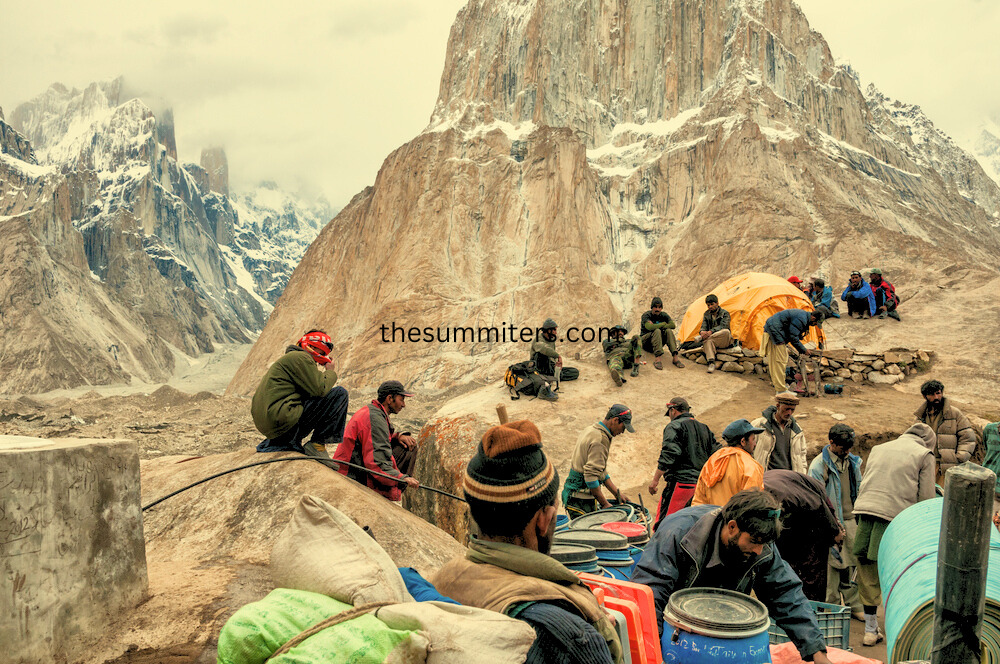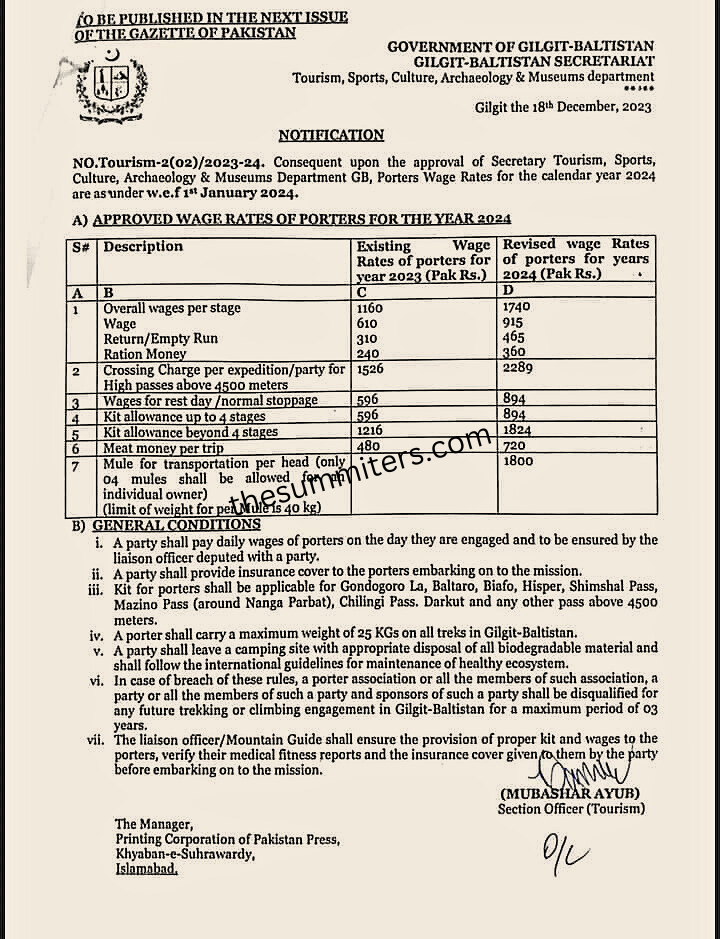In a deadly turn of events on K2, Ser Muhammad, a dedicated porter from Pakistan, unfortunately lost his life at Concordia yesterday after ongoing a harrowing 16-hour wait for an evacuation that never appeared. Ser Muhammad was part of a team supporting a K2 expedition when he fell ill with symptoms of Acute Mountain Sickness at approximately 5,000 meters, just shy of reaching Base Camp.
According to statements provided to Hum.com by the Pakistan Association of Tour Operators (PATO), Ser Muhammad initially received prompt medical attention from the on-site medical team. Firms grew as his condition deteriorated prompting an urgent appeal for an suspended evacuation. However, complications arose due to the stark disparity in insurance coverage between local porters and foreign climbers.
Muhammad Umar, Secretary of PATO, emphasized the difficulties faced: “Unlike foreign climbers who often have robust insurance coverage, porters like Ser Muhammad frequently lack such protection. Despite our humanitarian appeals, the critical window for evacuation was lost due to adverse weather conditions.”
Despite the approval from the military for evacuation, the unpredictable weather thwarted the timely arrival of the helicopter. Tragically, Ser Muhammad passed away the following morning while still in his tent at Concordia, highlighting the profound challenges and risks faced by those supporting expeditions in the treacherous terrain of K2.
This heartbreaking incident underscores the pressing need for equitable support and comprehensive safety measures for all expedition members, irrespective of their nationality or role.

The military pilots of Askari Aviation purely provide helicopter services in Pakistan. They usually charge around $20,000 per flight. Foreign climbers and
probably some favored locals may pay enough for an insurance policy to cover that expense but most local mountain workers can’t, least of all the porters who carry loads to Base Camp.
These are not even hired for the season but are paid by the day, according to rates established by the Gilgit Baltistan government:

Insufficient Insurance Coverage Highlights Perils Faced by Local Porters
The recent tragic death of Ser Muhammad has sparked renewed calls for better support and safety measures for local porters in Pakistan’s mountainous regions. According to Muhammad Umar from the Pakistan Association of Tour Operators (PATO), while the Gilgit-Baltistan government does provide some insurance coverage for local porters, it is capped at approximately $718. This amount falls far short of covering the costs associated with emergency rescues, leaving many porters vulnerable in critical situations.
Social media influencer Pir Faraz Ali voiced strong concerns about the inadequate rescue infrastructure in Pakistan’s mountains. He pointed out that the nearest hospital to Concordia, where Muhammad passed away, requires a challenging three to four-day journey by mule, highlighting the urgent need for accessible and timely emergency services.
“We urgently need a reliable and affordable helicopter rescue service for our local porters,” Faraz Ali emphasized. “These individuals work tirelessly during the climbing season to support their families, only to face such tragic circumstances.”
Faraz Ali also criticized the perceived ineffectiveness of the Alpine Club of Pakistan, calling for stronger advocacy and leadership to protect the rights and safety of local climbers and porters.
Muhammad Umar echoed these sentiments, urging prompt action from the Gilgit-Baltistan government and the tourism department to address these systemic issues and improve conditions for local workers.
Ali Porik, Vice President of PATO, confirmed that pilots had agreed to rescue Ser Muhammad, but unfortunately, he passed away before they could reach him. Currently, fellow porters are undertaking the arduous task of transporting Muhammad’s body by mule to his home village of Tisar.
“In response to this tragedy, PATO has launched an appeal for donations to support Ser Muhammad’s grieving family,” Porik added. However, the insurance payout is insufficient and navigating the bureaucratic process to access it adds further hardship for the family.
This heartbreaking incident underscores the perilous circumstances faced by local porters and underscores the critical need for comprehensive reforms to safeguard their well-being and ensure they receive adequate support and protection in their vital roles within Pakistan’s mountaineering industry.
Challenges and Controversies Highlighted in Recent Events in Pakistan
The recent passing of Muhammad has brought back painful memories of another tragic incident involving a Pakistani porter near K2. Last year, Muhammad Hassan tragically lost his life at the Bottleneck during a summit attempt, amid reports that some climbers bypassed him without rendering aid. In response, authorities had vowed to enhance support and safety measures for local workers, yet challenges persist.
This season, new issues have surfaced alongside other contentious matters, such as the arrest of Ali Saltoro from Alpine Adventure Guides following a fatal paragliding accident near Askoli involving pilot Rodrigo Raineri. Allegedly, the paragliders flew before obtaining proper permits, sparking debates about safety protocols and regulatory oversight for paragliding activities in Pakistan.
Ali Saltoro has been released on bail and awaits further legal proceedings. Discussions continue regarding the future of paragliding in the region, although Ali Porik clarified that flights are still permitted under strict pre-permit conditions.
Meanwhile, another incident gaining attention involves 15-year-old Selena Khawaja, who recently reached Base Camp. Her team shared a story on social media detailing oxygen mismanagement by their porters, which necessitated an unexpected night outdoors. Despite the ordeal, they assured followers that everyone is now safe and accounted for.
These events highlight ongoing challenges and controversies within Pakistan’s mountaineering community, underscoring the critical need for continuous efforts to enhance safety standards, regulatory clarity, and support systems for all involved in mountain expeditions.
